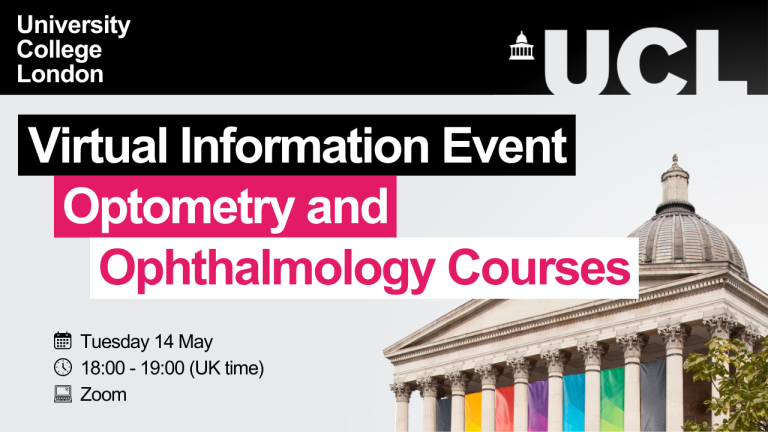Optometry and Ophthalmology (Advanced Clinical Practice) MSc / (Enhanced Clinical Practice) PG Cert
Why study the Advanced Clinical Practice MSc / Enhanced Clinical Practice PG Cert in Optometry and Ophthalmology?
Our programmes have been developed by practicing clinicians and researchers and deliver authentic education and training translated from the clinical setting to provide the necessary training to enable professional groups such as optometrists, orthoptists and ophthalmic nurses to contribute to the advancement of eye care delivery in primary, secondary or tertiary care settings. You will gain more specialist clinical knowledge and skills in glaucoma, ocular emergencies and cataract, clinical leadership, research and education in the healthcare setting and skills transferable to other settings.
They are delivered online via distance learning, in conjunction with workplace-based learning, offering you flexibility to study at your own pace to gain a new qualification while working.
Both programmes have been designed around you, as busy professionals, where the taught academic content is delivered online. In addition to online lectures, there will be webinars, group tasks and patient case discussions to enhance your learning. Cases are based on real patient episodes which are discussed with clinical ‘pearls’ from experienced advanced practitioners and world leaders in the field of ophthalmology and advanced practice, the majority of whom are clinicians from Moorfields Eye Hospital. At the end of term two of each year, optional workshops will be available in London for students to gain experience of specialist practical skills.
Workplace learning and assessment is conducted alongside the academic teaching to enable you to gain the necessary work-place skills to assess and manage patients and has been developed to complement your learning on the clinical and non-clinical modules.
What can Advanced/Enhanced practitioners do?
Advanced Clinical Practitioners practice autonomously within a defined scope of extended clinical practice to help manage the increasing burden of patient care which could include taking on clinical leadership roles, contribute to health professions education, supervision and research.
Enhanced Clinical Practitioners practice in the clinical setting under supervision of senior medical or advanced practice clinical practice clinicians. They are expected to contribute to wider healthcare activities such as quality improvement initiatives, transprofessional and clinical education and clinical audit and research activities.
Your employability and graduate attributes
- Extended and advanced roles in clinical ophthalmic practice
- A varied and interesting portfolio career
- Advanced practice with the opportunity to specialise in one of the four pillars
- Enhanced practice in the healthcare setting with the scope to undertake service improvement projects
- Transferable skills in education, research and leadership
Programme benefits
- Understand the disease process underlying common ophthalmic conditions (e.g., glaucoma and medical retina)
- Learn how to use diagnostic criteria to formulate patient management plans
- Develop decision-making skills underpinned by academic and clinical knowledge
- Provides credentialling for GOC registered optometrists
- Career options after completing the programme include: extended roles or advanced clinical practice in optometry and ophthalmology
- Non-medical ophthalmic professionals are extending their scope of practice to help manage the increasing burden of patient care in these areas
Links to other professional qualifications
- College of Optometrists Professional Higher Qualifications
For UK based, GOC registered optometrists and HCPC registered optometrists only:
These programmes provide the academic component of the College of Optometrists Higher Qualifications in medical retina and glaucoma only. You will need to undertake further assessments outside the degree and arrange work-based learning and assessments (placements) to complete the qualifications. For those undertaking the ACP and ECP programmes, this can be incorporated into the work-based learning and assessment requirements. UCL does not arrange placements on your behalf.
Some modules on this programme form the classroom or theoretical knowledge for the College of Optometrists (CoO) Higher Qualifications. The CoO qualification can only be obtained by UK based GOC registered optometrists. To gain a full CoO higher qualification, a clinical placement and practical exams will be required, which can only be carried out external to this UCL programme.
For UK-based optometrists, you will also be able to get CPD points required to maintain your professional registration on completion of academic modules on the programme.
Modules on this course currently need to be accredited by the College of Optometrists as they are currently undergoing reaccreditation.
- Ophthalmic Practitioner Training
Work-based learning and assessments undertaken as part of both programmes can be put towards attaining the OPT qualification with the Royal College of Ophthalmologists. Students will need to arrange registration with the Royal College of Ophthalmologists independently and may need to undertake further assessments.
- Access to observerships at Moorfields Eye Hospital
There are a limited number of observerships available at Moorfields Eye Hospital which will incur an extra charge. These are available on a first come, first served basis to students. These are arranged directly with the Moorfields Observership Scheme. Note that observerships cannot substitute placements.
Learn more about the programmes
- Programme structure for the Optometry and Ophthalmology (Advanced Clinical Practice) MSc
This is a full 180 credit level 7 Masters programme underpinned by the Advanced Clinical Practitioner framework.
The programme is usually studied over three years with students taking three fundamental modules in glaucoma, medical retina and ocular emergencies along with advanced practice in cataract in year one.
In year two, students take modules on the principles of advanced practice, clinical leadership, research and statistics and a specialist module in either glaucoma, medical retina or ocular emergencies.
In year three, students will undertake a 10,000 word Library based research project in an area of their choosing.
- Programme structure for the Optometry and Ophthalmology (Enhanced Clinical Practice) PG Cert
This is a 60 credit level 7 postgraduate certificate programme underpinned by the Enhanced Clinical Practitioner framework.
The programme is usually studied over two years with students taking three fundamental modules in glaucoma, medical retina and ocular emergencies along with advanced practice in cataract in year one.
In year two, students take an additional ECP Research In Practice module to provide them with an introduction to clinical leadership, quality improvement, research, and education.
They will then complete a Quality Improvement Proposal report while finalising their professional portfolio.
- Workplace Based Assessments
Workplace-based learning complements the academic modules and allows you to apply from in real life situation. It is designed to develop your skills to the highest level while gaining experience and feedback in an authentic workplace setting.
Workplace-based learning and assessment (WBLA) is a compulsory component of your course. This component of the programme is arranged by your employer, and is carried out and supported by your clinical and educational supervisors in your workplace. The university (UCL) will supply the curriculum for students to follow.
More information on what Workplace-Based assessment and Supervision entails can be found in the handbooks below:
- Teaching staff from Moorfields Eye Hospital and UCL
- You will be taught by Consultant Ophthalmologists and practitioners working at Advanced Practice level based at Moorfields Eye Hospital, ranked as the world's best eye hospital (SCImago Institutions Rankings 2023).
- Many of your medical module leads and tutors have been featured in the top 100 most influential ophthalmologists in the world in the Ophthalmology Powerlist 2023.
- Tutors and module leads also include decades-experienced practitioners working at Advanced level at Moorfields Eye Hospital.
- You will be taught by Consultant Ophthalmologists and practitioners working at Advanced Practice level based at Moorfields Eye Hospital, ranked as the world's best eye hospital (SCImago Institutions Rankings 2023).
- Entry requirements
BSc (Hons) 2:1 in Optometry, Orthoptics, General Nursing (evidence of ophthalmic specialty training is also required for ophthalmic nurses or OPT levels 1 and 2) OR an equivalent overseas qualification.
Students must also have support from their employer to provide appropriate supervision and opportunities to support the required work-based learning and assessment element of the programme (including provision of Education Supervision and opportunities to develop a Quality Improvement Project proposal for ECP). This is the responsibility of the employer – UCL will not arrange or facilitate these on the student’s behalf.
If you are unsure whether you meet the entry criteria, please contact the admissions tutors by emailing ioo.admissions@ucl.ac.uk to discuss your application.
If you don’t have the support required to complete the workplace-based assessment but are still interested in the academic elements, non-ACP/ECP versions of each course are also available as the Optometry and Ophthalmology MSc / PG Cert.
- Funding your studies
If you work for a UK NHS Trust, you may be eligible to apply for a grant to cover MSc tuition fees from NHS England for the MSc pathway only. In addition, you can apply for an additional grant to help with the additional work-based learning and assessments required. This needs to be organised by your employer and you should contact your line manager and Trust ACP lead.
The programmes are also available as ACP degree and ECP apprenticeships. If you work for an organisation or NHS Trust in the UK, it is advisable that you speak to your organisation’s apprenticeship manager and line manager about your eligibility to apply for funding from the Apprenticeship Levy, which is accessible to most organisations.
The academic and workplace-based programme content is the same and you will study alongside students on the Optometry and Ophthalmology (Advanced Clinical Practice) MSc / (Enhanced Clinical Practice) PG Cert.
Learn more about the Advanced Practice in Ophthalmology (integrated degree apprenticeship) MSc
Learn more about the Enhanced Practice in Ophthalmology Apprenticeship PG Cert
For a comprehensive list of the funding opportunities available at UCL, including funding relevant to your nationality, please visit the Scholarships and Funding website.
The UCL Institute of Ophthalmology International Excellence Scholarship is a prestigious scholarship programme aimed at talented international students who want to tackle pressing global health challenges.
Start your application
Ready to apply to the Optometry and Ophthalmology (Advanced Clinical Practice) MSc or Optometry and Ophthalmology (Enhanced Clinical Practice) PG Cert? Visit our prospectus pages to begin your application.
Register your interest
Interested in studying the Optometry and Ophthalmology (Advanced Clinical Practice) MSc or (Enhanced Clinical Practice) PG Cert at UCL? Sign up to hear about our future information events and news about the programme including when applications open at the following link.
What our students say

- Sejal Mistry, Advanced Clinical Practice in Optometry and Ophthalmology PG Dip
Why study at UCL?
- Our longstanding partnership with Moorfields Eye Hospital represents the largest co-located site for eye research, education and care in the world.
- The UCL Institute of Ophthalmology is ranked the best place in the world to study ophthalmology (CWUR Rankings by Subject 2017).
- UCL is ranked 8th in the world (QS 2022).
- In biomedical and health sciences, UCL is 1st in Europe for papers in the top 5% of their field by citation rate (2015-2018, CWTS Leiden Ranking 2020).
- UCL hosts more UKRI Future Leader Fellowships than any other UK university, with three academics at the UCL Institute of Ophthalmology receiving the prestigious fellowships over the last three years.
- As a student you will have access to innovative facilities, connection to a growing network of peers, and support from highly experienced and professional tutors.
Taster lecture videos
Watch a recording our recent Graduate Open Day webinar event.
 Close
Close



